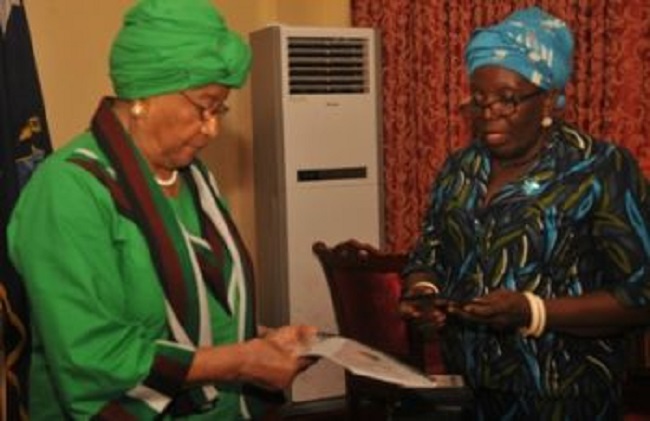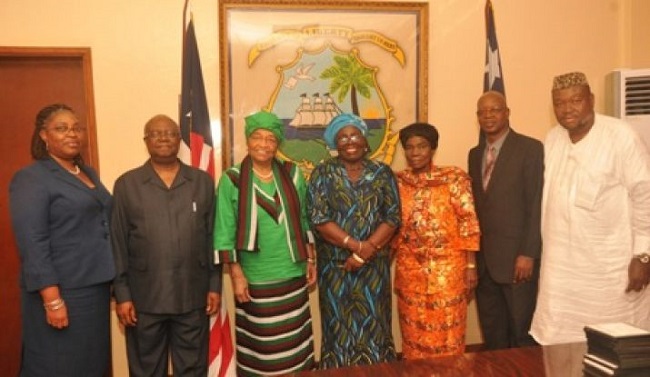Liberian constitutional review completed
Liberia’s Constitution Review Committee (CRC) on Monday presented its final report on the National Constitution Conference (NCC). Presented to President Ellen Johnson Sirleaf, the report also contains recommendations to amend the West African country’s constitution as well as several CDs of the 1986 Liberian Constitution in the 16 local vernaculars.
Speaking during a formal presentation ceremony at the president’s temporary Foreign Ministry office, the chairperson of the CRC, Cllr. Gloria Musu Scott, on behalf of her colleagues, thanked President Sirleaf for the confidence reposed in them to perform this task and for the opportunity provided them to form part of such an historic national project.
Cllr. Scott reported the excellent cooperation from ex-officio members, the Governance Commission (GC), Law Reform Commission (LRC) and partners that strengthened them particularly providing financial, technical and moral support during the process. “Their vast experience and knowledge were at our disposal and we have now reached this point,” she indicated.
The CRC Chairperson expressed special thanks to all Liberians and emphasized that the citizens’ participation in this review process was significant, most especially for their direct participation and through their delegates during the formal and informal consultative phase in the 73 electoral districts of Liberia and the National Constitution Conference held in Gbarnga, Bong County, from March 29 to April 2, 2015.
She praised the partners who contributed immensely to making the process a success. “UNDP provided initial seed money; UNMIL provided technical assistance from New York, helicopter services, UNMIL Radio; USAID significantly contributed to the National Constitution Conference, while United Nations Peace-Building Fund (UNPBF), among other partners, provided additional assistance,” she pointed out.
Cllr. Scott also highlighted the contribution of the state broadcaster, the Liberia Broadcasting System and the Liberian Women Democracy Radio that provided their media outlets free of charge for the dissemination of information to the Liberian public.
In response, President Sirleaf thanked the CRC for its excellent work. She also thanked the partners for the support they provided the CRC in executing its mandate.
Reflecting, the Liberian leader said in 1847, the country’s constitution to a large extent reflected the circumstances and desires of the settler class.
President Sirleaf furthered that recognizing that circumstances had changed, one needed to add more in terms of equal opportunity, equity and recognition of the role of the population; thus a new constitution came into effect in 1986 reflecting new circumstances of the country.
President Sirleaf stressed that that Constitution remained with a few amendments in 2011 to ensure that the country’s political process remain intact.
Starting in 2012, the Liberian leader continued, under the chairmanship of the GC and a committee formed under the “National Vision 2030,” there were consultations all over the country to form that National Vision.
“That consultation indicated that the Liberian people wanted more than what the 1986 constitution contained,” she emphasized, adding, “They wanted to see some revisions in some of those provisions; they wanted to ensure that certain equity and participation of the people were pronounced than what the 1986 constitution provided and so those consultations formed the basis for starting that process of amendments to the constitution,” she outlined, expounding further on the CRC’s mandate.
President Sirleaf clearly stated that the constitution stipulates that it’s the National Legislature that determines what kind of constitution amendments are made: but noted that as a result of the consultations in the CRC exercise, the document will pass through her, then taken to them.
Now that the CRC has presented the NCC report also containing recommendations to amend the constitution of Liberia, it is anticipated that thereafter, the Liberian leader will make a presentation to the national legislature for its due consideration.
In the event of approval of the proposals for amendment by two thirds of the duly seated members of both houses of the national legislature, the approved proposals will be published in an official gazette for public consumption and understanding.
The constitution mandates that this public education be conducted for a minimum of 12 months prior to the holding of a referendum. Proposals receiving the approval of two thirds of the voters voting in the referendum shall then become amendments to the constitution.
Liberia embarked upon the constitution review process in August 2012 as part of its national reconciliation by setting up the CRC based on the recommendations from the Governance Commission (GC).
To organize and lead this process, President Sirleaf established the CRC which eventually consisted of six eminent citizens as members; and two Ex-officio Members, Chairman of the GC and the chairperson of the Law Reform Commission (LRC). This review process is intended to form part of addressing Liberia’s governance pitfalls and consequently engender reconciliation.
Liberian Government
Photos: James M. Garresen/Executive Mansion



